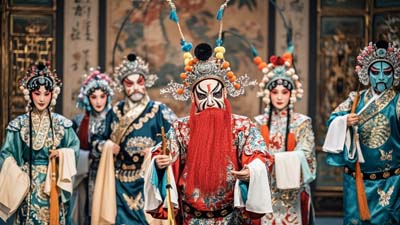
Chinese traditional operas, of a long history and well established, are one of the cultural and artistic forms of the Chinese nation. These ancient types of drama are still active on China’s stages today. Of all the traditional types of drama, Peking Opera is the most influential. Emerging in Peking two hundred years ago and popular throughout the country, Peking opera has a rich array of more than five thousand traditional items, mostly depicting ancient stories in China.
After more than two hundred years of development, Peking Opera now boasts of many schools and masters of performing art. Each school has its own outstanding features and their performing skills are deeply loved by the audience.
Characters in the opera are roughly divided into four types of role, namely: “生 (shēng), 旦 (dàn), 净 (jìng), and 丑 (chǒu).” Every type has its telltale facial makeup and decoration.
“生 (shēng)” is the positive male role, “旦 (dàn)” is the positive female role, “净 (jìng)” is a supporting male role with striking character and “丑 (chǒu)” is the clown. Every type has its telltale facial makeup and decoration.
”Jìng” shì xìnggé xiānmíng de nánxìng pèijué.
“Jìng” is a supporting male role with striking character.
Tóngchuí: yě chēng “zhèng jìng,” bànyǎn shēn fèn zūnguì, qìdù wēiyán, xìnggé gāngzhí de juésè.
铜锤:也称“正净”,扮演身份尊贵、气度威严、性格刚直的角色。
Tóngchuí of color face is a representative of honorable, dignified and upright role.

Jià zǐ: yě chēng “fùjìng,” bànyǎn xìnggé háoshuǎng tǎnzhí 、huò lǔmǎng bàozào、huò yīnxiǎn jiǎozhà děng huāliǎn juésè.
架子:也称“副净”,扮演性格豪爽坦直、或鲁莽暴躁、或阴险狡诈等花脸角色。
Jià zǐ is a representative of either rough man or a man who likes showing his ability to the full extent or a treacherous character.

Wǔjìng: bànyǎn jīngtōng wǔyì , wǔdǎ yǒngměng de huāliǎn juésè.
武净:扮演精通武艺、武打勇猛的花脸角色。
Wǔjìng is a representative of character who is versed in military arts and mainly makes acrobatic fighting.

“Chǒu ”shì yōumò huájī huò fǎnmiàn juésè.
“Chǒu” is the clown.
Wénchǒu: bànyǎn shànliáng, jīzhì , yōumò huò bēiliè, yúchǔn, diāohuá děng juésè.
文丑:扮演善良、机智、幽默或卑劣、愚蠢、刁滑等角色。
Wen Chou is positive humorous characters or negative cunning characters.
(Civilian comedian)

Wǔchǒu: bànyǎn shēn huái juéjì, wǔgōng jīngzhàn de jiānghú xiákè huò wǔ lín gāoshǒu děng juésè.
武丑:扮演身怀绝技、武功精湛的江湖侠客或武林高手等角色.
Wu Chou: A military hero adept in martial arts and given to chivalrous conduct.
(Military comedian)

There is no lacking of social celebrities among Peking opera “票友 (piàoyǒu).” Emperor Guang Xu of Qing Dynasty, for example, was not only a good amateur Peking opera singer, but was also a good drummer in the Peking opera orchestra (the drummer plays the role of the director of the orchestra). The Empress Dowager was an avid Peking opera fan, too. The huge three-storey theater in the Summer Palace is a proof of her love for Peking opera.
1.生 (Shēng): life; living; lifetime; birth (it refers to a kind of character type in Chinese opera.)
2.旦 (Dàn): dawn; morning; day (it refers to a kind of character type in Chinese opera.)
3.净 (Jìng): clean; pure; cleanse (it refers to a kind of character type in Chinese opera.)
4.丑 (Chǒu): clown; comedian (it refers to a kind of character type in Chinese opera.)
5.票友 (Piàoyǒu): amateur opera actors
Chinese Culture
General Chinese (Beginner Level)
General Chinese (Intermediate Level)



